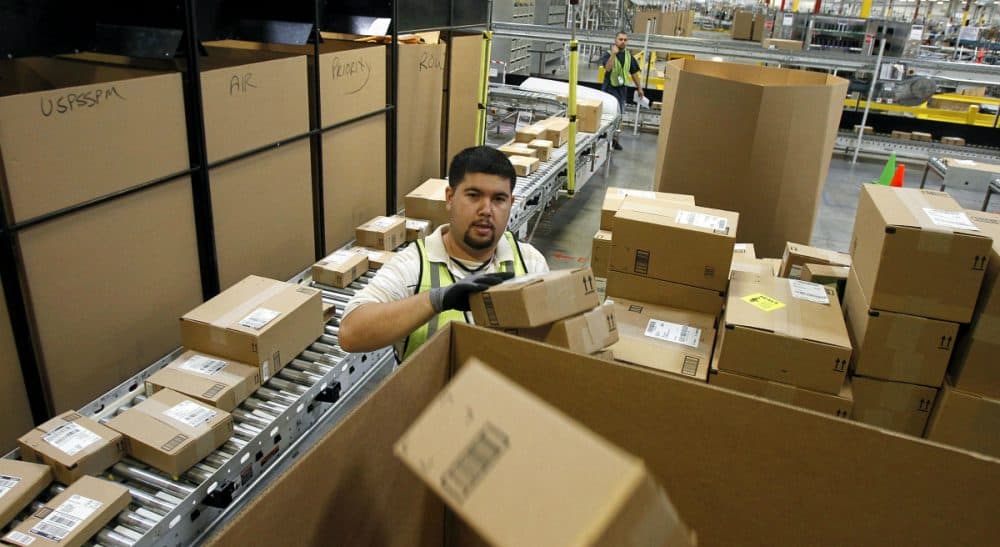Advertisement
In Corporate America, Public Scrutiny's Protective Bubble

Jeff Bezos has been getting a lot of heat lately about Amazon’s management style. People are wringing their hands about the way his workers are treated. Others are up in arms about the evil ways of giant corporations.
They have it all wrong.
Big corporations may be cutthroat, but they live under the glare of publicity and under the threat of strikes and boycotts and shareholder lawsuits. Most of American industry is actually comprised of small businesses. And in my experience, few big business executives can afford to be as malevolent as a small business owner on a power trip.
Big corporations may be cutthroat, but they live under the glare of publicity and under the threat of strikes and boycotts and shareholder lawsuits.
Twenty years ago I worked for a computer consultancy that we shall call Cat’s Meow Consulting, under the leadership of a high-tech veteran whom we shall call Lawrence. Lawrence had a lengthy resume. Or, as a colleague pointed out, “He’s been fired an awful lot.” That didn’t bother me at the time, but it should have.
I’d never have taken the job if I’d had the sense during my interview to ask to visit the restroom, which might have given me the chance to look around. I was kept in a conference room where a sequence of people popped in to visit me and offer me refreshments. Had I seen the rest of the space, with eight desks jammed into an area that would have been crowded for three, I’d have been out of there in a flash. When clients visited, employees were ordered to stay out of sight and keep the office doors closed.
Four men and four women worked for CMC, but we were instructed to tell people who asked about our headcount, “I really don’t know — we have so many foreign affiliates.” It was before affordable voicemail, and the phones were set up so all four women would get a shot at answering them before a man had to do it.
My job was to include compiling a lengthy industry report based on extensive research, filled with charts and solemn pronouncements. My base salary was minuscule but I was promised a bonus when I finished the report. The trouble was that it wasn’t finished until after I was gone, 10 months later. Lawrence just never seemed to have time to put the finishing touches on it.
Despite the toxic environment, nobody left while I was there. Shortly after I arrived, I learned why: Everyone was afraid of Lawrence. One employee confessed that Lawrence had helped him dry out after a series of DUIs. “If I leave,” my co-worker said, “and they ask Lawrence for a reference, he’ll find a way to mention that."
That technique worked on clients, too. CMC sold expensive market studies I was there when Lawrence told one of them, “If you don’t buy our latest study, I’ll have to believe that you’re not at the forefront of the industry. And I talk to the Wall Street Journal all the time.” The CEO bought three studies.
He hired a clerk at $7.50 an hour for 32 hours a week, and told her she’d get a raise to $10 after she passed a typing test. She passed the test and got her raise — but her hours were cut to 24 a week. Do the math.
entrepreneurs can be masters of bullying. And you may not spot them because small companies are under the radar.
I wasn’t afraid to fight with Lawrence, perhaps because I was middle-aged like him where most of the others were young, and he could get away with telling them he paid competitive salaries. When he finally showed me the door, and I asked for time to pack, he ordered one of the young people to call the police. Then another. Then another. No one would do it. I later heard that he had docked their pay 10 percent for insubordination. That finally gave two of them the courage to quit. I’d been trying to get a mortgage at the time, and his first act after I left was to call the mortgage broker and tell him I no longer worked there. Needless to say, I dropped the company from my resume.
I thought of suing, but a lawyer said, “You can’t prove damages. You’re much better off than you were.” I talked to the anti-discrimination folks, and they said, “He may be a bastard, but you can’t prove he discriminated against you.” CMC stayed in business for several more years.
If Amazon shafts its employees, there’ll be newspapers (other than the Washington Post, which Bezos owns) and radio stations and TV reporters and bloggers ready to listen. But entrepreneurs can be masters of bullying. And you may not spot them because small companies are under the radar. Before you go to work for one, make sure the boss didn’t start the company because he couldn’t keep a job.
